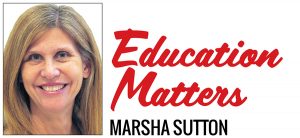Education Matters: Carlsbad tackles Diversity Equity Inclusion plan
March 17, 2023
Recent Carlsbad Unified School District board meetings have been loaded with agenda items that engaged — and often enraged — speakers.
School board members and staff at Carlsbad Unified’s Feb. 15 board meeting were addressed by 17 impassioned speakers with very clear ideas on the district’s proposed Diversity Equity Inclusion strategic plan, among other hot topics.
The majority of speakers supported implementation of the DEI plan.
Jennifer Zamora said trustees Gretchen Vurbeff, Elisa Williamson and board President Ray Pearson were uneducated about DEI and urged the board to pass the plan.
 “DEI is not propaganda,” Hannah Summerhill said. “It’s a response to white supremacist propaganda that this country is built on. It’s imperative that we teach our kids better.”
“DEI is not propaganda,” Hannah Summerhill said. “It’s a response to white supremacist propaganda that this country is built on. It’s imperative that we teach our kids better.”
Christina McGoldrick said it’s not indoctrination, as opponents have claimed. She said bias is systemic and embedded in the system.
Jen Hemberger said many students are suffering and “DEI helps every child.”
Several students and teachers spoke in favor of DEI, including Cheyenne Perkins, a seventh-grade CUSD student who founded a Black student union at her school.
“I’ve experienced many racist comments at my school,” she said, suggesting that students should be involved in such board decisions.
Those opposed to the DEI plan included Audra, who said, “You’re telling people the way they should think.”
Jen Belnap said parts of DEI fail to fit the core elements at CUSD.
Scott Davison, who ran unsuccessfully for Carlsbad Unified school board last year, said there’s no consensus for the definition of DEI and that the district is using Poway’s plan, which is “replete with problems and doesn’t reflect Carlsbad.”
Controversy
CUSD defines diversity as referring to all aspects of human and social group differences, equity as fair and just practices and policies that ensure all community members can thrive (different from equality, which implies treating everyone as if their experiences are the same), and inclusion as a place where all community members are respected, have a sense of belonging and are able to participate fully.
“I don’t fully understand why the topic has become so controversial,” Benjamin Churchill, Carlsbad Unified’s superintendent, said in an email. “I believe that schools should be welcoming and safe for every student and staff member.
“For me, it’s about ‘belonging.’ Do our students and staff feel like they belong in our classrooms and schools? Are students able to see themselves reflected in what they learn about, and are they also able to learn about others? Do they feel seen and heard? Do they feel safe? And if not, what are we doing about it?”
“Not all students are starting on the same plane when it comes to access to courses and supports,” said San Diego County Office of Education Communications Strategist Steven Baratte, explaining the rationale behind the push for DEI.
“When we say equity is about giving students what they need and deserve to thrive in school and beyond, that’s not about taking anything away from other students,” he said.
Instead, he said, equity is additive, by providing resources that address individual students’ needs beyond the basics.
“I don’t think anyone would claim that every child in our systems is reaching their full potential,” Baratte said.
Carlsbad Unified educates approximately 11,150 students in grades kindergarten through 12th. Demographics released by CUSD in January show the following: 55.5% white, 27.3% Latinx, 9.3% two or more races, and 5.5% Asian.
The district includes 6% English learners, 14.6% students with disabilities, and 22.1% socio-economically disadvantaged.
Churchill said the state is not requiring school districts to implement DEI plans, although districts are required to indicate how they intend to provide support to all student populations, including low income, homeless, English learners and other underserved populations.
Churchill said the San Diego County Office of Education “has suggested that districts might better support students through the development of a DEI plan … and has a team in place to support this type of work.”
In a detailed SDCOE brochure titled Equity Blueprint for Action, county education Superintendent Paul Gothold wrote that SDCOE was one of the recipients for the California Department of Education’s equity grant program, which has provided funding to promote equity in education and has allowed the county office “to deepen our equity work.”
Goals
Carlsbad Unified’s DEI plan has three goals, and each goal has two to four “success indicators” to measure progress:
Goal 1: Prepare students and graduates for diverse and inclusive environments by fostering the development of trusted relationships with staff and the community.
Goal 2: Empower CUSD education professionals to create safe and inclusive learning environments that allow for unique backgrounds, cultures and shared experiences to fuel a growth mindset.
Goal 3: Build structures that incorporate diversity, equity and inclusion.
At the Feb. 15 meeting, the success indicators were debated at length by board members, who tweaked many of them before final approval.
The one that created the most debate was Elisa Williamson’s proposal for Goal 1 to expand sending surveys on the issue to students, parents and staff, by adding town hall meetings after survey results have been compiled in order to engage the greater Carlsbad community.
That would include the Carlsbad Chamber of Commerce, the Carlsbad Educational Foundation and faith-based groups, which would all be invited to attend the open town hall meetings.
Churchill said the purpose would be “to present the findings from the survey and solicit additional feedback.”
Williamson asked that staff members send the survey on topics related to DEI to students, parents and staff, and post it on the CUSD website by April 15. The survey would be reviewed by board members before distribution.
For Goal 2, Williamson suggested the first of three town hall meetings be conducted by June 1, the other two to be held later that month.
Trustee Kathy Rallings opposed the hasty timeline, but staff members said the deadlines were achievable.
The modifications were adopted by a 3-2 board, with Rallings and Trustee Michele Ward opposed.
Restorative justice
The third goal, focused more directly on ways to promote DEI, includes using the Anti-Defamation League’s No Place For Hate program at secondary school sites and to continue with Social and Emotional Learning lessons “that address inclusivity, respect and equity” at all nine elementary school sites.
Another indicator of success toward the goal states to implement evidence-based restorative practices at all schools in order to reduce harassment, bullying and hate-motivated speech.
After Williamson asked for a clearer definition of restorative practices, Ward said, “The point is to give kids an opportunity to understand the hurt that bullying causes … and give them an opportunity to come together.”
She said it’s not punitive but rather is about building and restoring relationships and bringing students together to help them understand the harmful effects of all forms of harassment.
“Expelling or suspending or disciplining a student for bullying doesn’t solve the problem,” Rallings said.
“What I’m hearing in the community is a very different thing so that’s why I think it’s helpful that we explain what we mean by restorative,” Williamson said. “It doesn’t mean removing consequences.”
The heart of this goal, Churchill said, is to reduce harassment and bullying.
Robert Nye, CUSD’s assistant superintendent of instructional services, said restorative practices involve positive interventions in lieu of disciplinary measures. Nye said the district’s board policies offer “16 alternatives to expulsions or suspensions that we could use.”
Churchill clarified later in an email that some offenses, including possession or sale of weapons or drugs, require automatic suspension or expulsion.
Heightened tension
On the Feb. 15 consent agenda was an item asking the board to approve the establishment of the Carlsbad High School Equality Coalition Club. This was pulled from consent by Trustee Vurbeff, which allowed board members to openly discuss it.
As described in the agenda item, the purpose of the Equality Coalition Club “shall be to highlight and empower young voices to make a change in their community … and discuss the current state of critical issues impacting Carlsbad.
“This can vary from addressing national issues to addressing injustices in the community on the local level. The club will encourage students to participate in weekend protests or attend out-of-school events.”
Vurbeff took exception to its encouragement of students to take part in protests. The item passed 4-1, with Vurbeff opposed.
A heated discussion about another consent item that was pulled was consideration of a new semester-long class at Carlsbad High School titled Film Academy Ethnic Studies, slated to begin next spring for ninth-grade students.
Given the volatile nature of the topic in today’s climate, did staff members really believe this could pass without discussion on the consent calendar?
The combined issues of Diversity Equity Inclusion, Ethnic Studies and Critical Race Theory — and even the ADL’s No Place For Hate and Social and Emotional Learning — have heightened the tension at many school board meetings.
Carlsbad is not alone.
There’s real fear here, an imagined consequence that white children will be made to feel guilty when they are taught about other cultures and student experiences.
Even No Place For Hate and SEL have been labeled cultural indoctrination simply for attempting to help children understand the brutal effects that hate speech, bullying and harassment can have.
Helping children understand this, and providing support to those victimized, are worthy lessons that kids need now more than ever.
More on this in the next column on Carlsbad Unified’s challenges.
Marsha Sutton is a local education journalist and opinion columnist and can be reached at suttonmarsha[at]gmail.com.
Columns represent the views of the individual writer and do not necessarily reflect those of the North Coast Current’s ownership or management.
The North Coast Current welcomes letters to the editor and longer commentaries.





